
Topics
We speak with Fernando Suarez del Solar whose son, Jesus, was one of the first U.S. servicemen killed in the invasion of Iraq. A new study finds that Jesus may be one of eight U.S. soldiers killed by unexploded bomblet dropped by U.S. forces. Fernando Suarez del Solar recently returned from a week-long trip in Iraq. [Includes transcript]
A USA Today study has found that the U.S. dropped or fired nearly 11,000 cluster bombs or cluster weapons on Iraq during the invasion and Britain dropped 2,000 more. It is unknown how many Iraqis died from cluster bombs. One estimate puts the total at 370. And the attacks left behind thousands of unexploded bomblets. At least eight U.S. soldiers and an unknown number of Iraqis have been killed by unexploded bomblets.
USA Today reports that one of the soldiers killed may have been Lance Cpl. Jesus Suarez del Solar. He died March 27 after stepping on some type of unexploded ordnance while on reconnaissance patrol outside Baghdad. He was 20 years old. A Marine investigation concluded that the “origin of the ordnance is unknown and really impossible to determine.”
But the dead Marine’s father, Fernando Suarez del Solar has a different account. He says he was contacted by one of his son’s friends, who said the Army dropped cluster weapons on March 26 and not all of the submunitions exploded. He is now seeking an official explanation for his son’s death.
Fernando Suarez del Solar joins in the studio today. He recently returned from Iraq where he joined eight other Americans, including veterans, activists and other parents of servicemen on a trip organized by Global Exchange and the International Occupation Watch Center. They spent a week traveling in Baghdad, Fallujah and Tikrit and talking with Iraqi civilians and American soldiers on patrol. They met with the U.S. administrator for Iraq, L. Paul Bremer, and with military officials.
- Fernando Suarez del Solar, the father of Marine Lance Cpl Jesus Suarez, one of the first U.S. servicemen killed in Iraq on March 27, 2003.
- Medea Benjamin, co-founder of Global Exchange and Occupation Watch, and co-organizer of the delegation to Iraq.
Transcript
AMY GOODMAN: In our studio we are joined by Fernando Suarez Del Solar, who lost his son Jesus in Iraq. He believes he died as a result of a cluster bomb, although he was told that he was shot in combat. We are also joined by Medea Benjamin, who is the cofounder of Global Exchange, the human rights group based in San Francisco who has been to Iraq many times and protested that war around the country here in the United States, has been arrested in Washington doing that, and has interrupted many a political official’s statements with her protests. You went to Iraq for what reason Medea, with this very special delegation of veterans and family members of those lost or fighting in Iraq?
MEDEA BENJAMIN: Well, these family members have grave concerns about what’s happening in Iraq, and feel like they have more at stake than the general population. They wanted to go, knowing the risks. One woman, who has two children there, drove twice along the most dangerous road in Iraq up to Tikrit to try to visit her daughter, who she hadn’t seen in three years. These people want to know the truth and they want to come home and lobby to get the troops back home. Some of them feel proud their children helped overthrow Saddam Hussein. Some of them were against the war from the beginning, but they all feel that the job of policing Iraq is not an appropriate job for the U.S. military. It’s time for them to come home.
AMY GOODMAN: You, Fernando, are wearing a pin that says, money for schools not for war.
FERNANDO SUAREZ DEL SOLAR: Yes. This one is the point. The war is not good for nobody. Nobody is winning the war. Everybody loses. And in America, there’s no money right now for the schools and education. A lot of teachers have lost jobs. But the money is going to the army. The recruiters are in the school. I understand the culture, the military culture in America when the children are in school.
AMY GOODMAN: Where are you originally from where were you born?
FERNANDO SUAREZ DEL SOLAR: I’m born in Mexico. My son, too. All of my family is from Mexico.
AMY GOODMAN: It’s interesting that your son was born in Mexico. The first day that Al-Jazeera had its English language website I think one of the first reports on it was about the green card army, about how many people, young men and women, who were sent to Iraq, were actually born in other countries.
FERNANDO SUAREZ DEL SOLAR: A lot of them. A lot of boys use the green card inside the military system. This one is because the recruiting people is the target — is Hispanic, the minorities, the ethnics in the schools.
MEDEA BENJAMIN: Fernando had a chance to talk to many Latinos in Iraq that he brought letters from U.S. children to both children in Iraq as well as to soldiers. And it was quite amazing to see the interactions between Fernando and the Latino soldiers giving them these letters from the children, all with the message that we love you, we support you, we want you to come home.
AMY GOODMAN: What was the response of the soldiers?
FERNANDO SUAREZ DEL SOLAR: Some boys just cried. And they said thank you. Thank you for helping me. All boys, when I have a meeting in the street in the checkpoints I explain what is the mission, what is the campaign we bring the troops home now and show the letters from the children, all — everybody, American and Hispanic — thank you. Thank you. We need you back home.
AMY GOODMAN: What, overall, was the feeling of the troops? I mean, did you find people felt it was right that the U.S. was there, felt it was wrong of the troops you spoke to in Iraq?
FERNANDO SUAREZ DEL SOLAR: The Iraqi people?
AMY GOODMAN: No, the U.S. soldiers.
FERNANDO SUAREZ DEL SOLAR: Oh, the U.S.
AMY GOODMAN: And then, yes, the Iraqi people.
FERNANDO SUAREZ DEL SOLAR: I will start with the boys and say, what you are feeling about here? What is your job here? Some boys say, I don’t know. I don’t know what I do here. The other boys say, freeing the Iraqi people, but this one is finished. The Iraqi people are now upset with the military. The first time they happy, but now nobody is happy. In the streets when they have the patrol, they’re very nervous. You see the face is children, 19, 18 year, but the faces are very nervous because nobody likes the military in the streets. And the Iraqi people, when I ask them, say I am fine because there’s no more Saddam Hussein, but Bush say, we have a Democracy, a freedom country. It’s eight months and I no have democracy here, and I don’t have nothing here. I love my job, I love my family, and the military is in the streets and I can do nothing. Is this democracy in America? I no want.
AMY GOODMAN: We’re talking to Fernando Suarez Del Solar. His son, Jesus Suarez Del Solar was 20 years old when he was killed in Iraq. Medea Benjamin cofounder of Global Exchange led this delegation to Iraq. How does Iraq compare now to the many other times that you have been there?
MEDEA BENJAMIN: Well Amy perhaps I’m very naive, but I assumed that things would be better. We went to a school and hospital the first day we were there and we were all in shock. The pediatric hospital didn’t have antibiotics. It didn’t have basic, basic equipment. It didn’t have the right size I.V.’s for the children. We all started to cry when they told us that things were better in the hospital under sanctions, and then we went to a school, and this was one of the many schools that Bechtel was supposed to improve.
AMY GOODMAN: The San Fransisco based corporation. Your home town.
MEDEA BENJAMIN: Yeah. The school had no books because they couldn’t use the Saddam Hussein books, and they had no new books, so they were worse off. We said, 'Do you have electricity?' They said first of all, the electricity goes on and off all the time, but secondly, we don’t have light bulbs. They didn’t have light bulbs, Amy. The windows were all broken. It was freezing now in the classrooms. They had no heaters. They had nothing.
AMY GOODMAN: did you meet with L. Paul Bremer?
MEDEA BENJAMIN: Yes. We met with Paul Bremer. The U.S. didn’t know what to do with this delegation. They tried to get us not to go. They said it was too dangerous. They couldn’t guarantee our safety. They harassed people before leaving to make them feel they would be arrested, that this was an illegal trip. Some of the people dropped out. We went anyway. Paul Bremer didn’t want to meet with us. He was forced to meet with us because of the power of Fernando and the other families. And they didn’t help us get to the bases. They didn’t help us interact with the troops. We just did it anyway. I just wanted to tell a quick story of the power of Fernando and this group. The first day we went to see a family whose son had been killed by U.S. troops in, quote, an “accident.” We heard the terrible story of Fernando and the father cried together. The day after we left, a U.S. military commander went to the base, gave the family $10,000 and said they would give them $3,000 a month, but please don’t talk anymore to Americans or to the military or to the media. This delegation has a tremendous power. We’re going to use the power of the delegation now that we’re home to lobby to get the money to the Iraqis that they deserve and get the troops out of the streets and get them back home.
AMY GOODMAN: What about the meeting with Lt. Paul Bremer. What did he say? What did he say to you, Fernando, and at that point, did you know that your son was killed with a cluster bomb and did you raise it with the U.S. overseer in Iraq?
FERNANDO SUAREZ DEL SOLAR: With Mr. Bremer?
AMY GOODMAN: Yes.
FERNANDO SUAREZ DEL SOLAR: Mr. Bremer is about three and half minutes only meeting with the delegation and received the letter.
AMY GOODMAN: Three-and-a-half minutes. Where did he meet you?
FERNANDO SUAREZ DEL SOLAR: He said, I’m sorry, I’m going to try — I’m going to try to find the time for more big meeting with the delegation.
AMY GOODMAN: Did you actually go into his office?
MEDEA BENJAMIN: We met with the Iraqi governing council, the president and several other members. They were anxious to meet with us. When Paul Bremer found out we were meeting with the Iraqi leadership, then he felt obligated to meet with us.
AMY GOODMAN: And what did he say?
MEDEA BENJAMIN: Well, he didn’t say anything. It was all diplomatic, but the head of the Iraqi governing council, when we said do you think that the troops should leave, he said yes. We said when? He said tomorrow. This is the Shiite who has the largest following of any member of the U.S.-appointed Iraqi governing council. He told us that he thinks it’s a mistake that the troops are still there, that they should leave.
AMY GOODMAN: You’re still wearing pink, Medea Benjamin. Is code pink still active, the feminist anti-war group?
MEDEA BENJAMIN: Very active and we’re active in Iraq. We set up the occupation watch center, which is the center that organized this amazing trip. And we continue to work against the war both here in the United States, and with Iraqis, particularly Iraqi women. We’re speaking tonight in New York.
AMY GOODMAN: Both Fernando, you and the whole group that went to Iraq.
MEDEA BENJAMIN: The entire delegation with lots of footage from our trip. We’ll be at 7:00 p.m. at the Washington Square Church in New York City.
AMY GOODMAN: I want to thank you for being with us. Your thoughts upon your return, Fernando, we’ll end with those.
FERNANDO SUAREZ DEL SOLAR: Thank you.
AMY GOODMAN: If you would like to share, as you return to New York now, and the United States, your thoughts having made this trip to Iraq.
FERNANDO SUAREZ DEL SOLAR: We will show the American people this occupation is no good for everybody, and the American people need to push the government to finish it and come back home with the troop as soon as possible.
AMY GOODMAN: Thank you very much. You are listening to Democracy Now! As we take a little musical interlude. We’ll talk with attorney Jules La Belle, who has lost many court battles, but still feels that social change has been accomplished by those losses and then Ralph Nader. He will join us on the phone as he travels the country having set up an exploratory committee deciding to run for president in 2004. Stay with us.

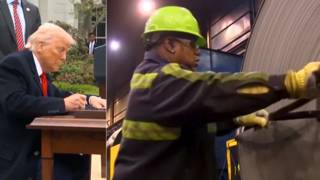
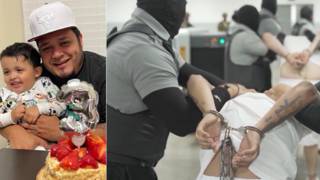
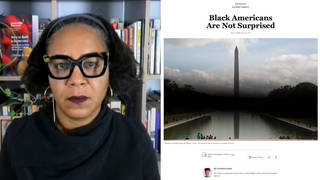
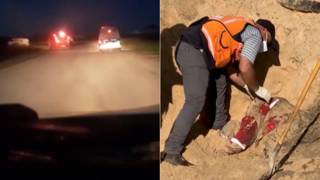






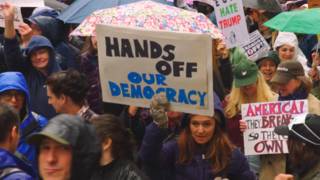
Media Options